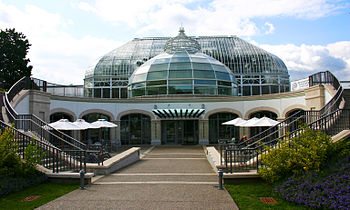
Pittsburgh, Pa. — This winter, the beauty of the tropics will flourish at Phipps Conservatory and Botanical Gardens as the public garden gets ready to unveil Tropical Forest Congo, an exhibit highlighting some of Africa’s lushest landscapes. The result of years of research culminating in a trip to Cameroon, where Curator of Horticulture Ben Dunigan and Exhibit Coordinator Jordyn Melino acquired knowledge and inspiration by visiting the region’s most breathtaking natural areas and learning from its indigenous tribes, the installation will open on Feb. 7, 2015.
For the displays, more than 60 percent of the Tropical Forest Conservatory plant life will be changed out to feature many varieties of flora never before showcased at Phipps. Among the specimens, sourced from nurseries throughout the U.S., as well as from seeds procured from Nigeria, are sausage trees (Kigelia africana) — known for their fragrant red flowers that, when pollinated, form large tubular fruits that can weigh up to 22 pounds — and the Napolean hat plant (Napoleonaea imperialis), which bears passionflower-like blooms on its trunk.
Tropical Forest Congo will also incorporate education stations, including a market displaying regional foods; a replica of a small dwelling that one would see in a village built by the Baka, a tribe that resides deep in the forest; and several kiosks exhibiting tools and equipment often used by botany researchers in the field. Additionally, the Special Events Hall will be graced by a façade designed to resemble a palace in which a king of the southwestern Cameroon Bamileke tribe would reside, complete with ornately decorated wooden columns. Beaded artifacts, such as ceremonial elephant masks, and stones carved by local artist Richard Hower will be on view, too.
To celebrate the opening, a special festival, held from 11 a.m. – 4 p.m. on Feb. 7 and included in the price of Phipps admission, will feature fun activities for children, including a storytelling performance, a pot-a-plant table, cultural crafts, food sampling, and visits from researchers supported by the public garden’s Botany in Action Fellowship. Two photo displays will complement the exhibit as well. The first, located in the Center for Sustainable Landscapes Green Gallery, will include images documenting From the Ground Up, a partnership between Phipps and Gidan Makama Museum in Kano, Nigeria that engaged 31 high school students in a collaborative project focused on food, nutrition and culture. The second, situated in the hallway behind Special Events Hall in the Tropical Forest Conservatory, will feature photos taken by Melino and Dunigan during their research trip.
“The creation of Tropical Forest Congo has been quite a journey, drawing not only on the vision of the Phipps staff but also on the contributions of both Pittsburgh community members with ties to the region and experts abroad,” says Phipps Executive Director Richard V. Piacentini. “We are excited to see the results of this collaboration come to fruition and hope that the new exhibit will not only delight visitors with its beauty, but also foster a greater understanding of our shared relationship with nature.”
When the Tropical Forest Conservatory opened in 2006, Phipps had not only unveiled the most energy efficient structure in the world but also raised the bar for sustainable design across the globe. Featuring waterfalls, a treetop canopy walk and serene ponds, this multi-level display space explores the connections between cultures and plants through educational programming, changing themes every three years to interpret a different natural area. Tropical Forest Congo will continue in this tradition, providing fresh scenes and points of interest. To learn more about the exhibit, plus the April 23 grand opening gala, visit phipps.conservatory.org.
About Phipps: Founded in 1893, Phipps Conservatory and Botanical Gardens in Pittsburgh, Pa. is a green leader among public gardens with a mission to inspire and educate all with the beauty and importance of plants; to advance sustainability and promote human and environmental well-being through action and research; and to celebrate its historic glasshouse. Learn more: phipps.conservatory.org.

